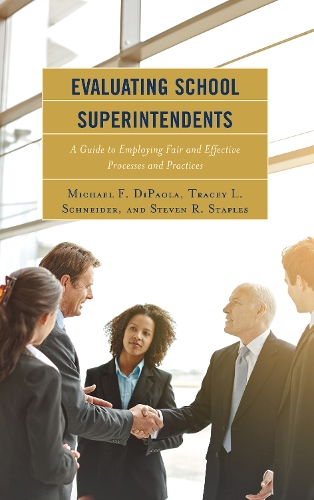
Evaluating School Superintendents: A Guide to Employing Fair and Effective Processes and Practices
(Paperback)
Publishing Details
Evaluating School Superintendents: A Guide to Employing Fair and Effective Processes and Practices
By (Author) Michael F. DiPaola
By (author) Tracey L. Schneider
By (author) Steven R. Staples
Bloomsbury Publishing PLC
Rowman & Littlefield Publishers
26th July 2019
United States
Classifications
Professional and Scholarly
Non Fiction
Schools and pre-schools
371.2011
Physical Properties
Paperback
238
Width 153mm, Height 219mm, Spine 18mm
354g
Description
This book provides guidelines to Boards of Education and the members of communities to conduct a high-quality, research-based evaluation of their school superintendent. It also includes examples of contemporary practices of evaluating superintendents practiced across the United States. In exploring the important issue of evaluation for the superintendent the complexities and aspects of the process that make it unique are highlighted.
Issues addressed include:
Existing state policies that require/govern superintendent evaluations & their impact on practiceEvaluation models that should be considered for evaluating superintendentsThe consequences of not having a clear set of policies/proceduresDetermining the major roles and responsibilities upon which the superintendent's evaluation should be based Documenting the superintendents job performanceThe policy, procedures, and training required for board members to successfully implement a superintendent evaluation system
The evaluation process proposed ensures fairness to the superintendent as well as providing accountability to the school district and community. The focus of all evaluations should be on improved performance. Evaluation is a means to an end. The ultimate purpose of superintendent evaluation is improving individual performance in order to ensure quality services and programs to students.
Reviews
The superintendent oversees or manages all aspects of the school division. He or she is directly responsible for the daily activities, functioning and outcomes. He or she is directly accountable to the school board. Thus, the school board and superintendent relationship must be very sound, strong and trusting. The superintendents evaluation instrument must be direct, concise, and objectively identify the performance indicators/standards to which he or she will be evaluated. The performance standards serve as the foundation of the evaluation instrument. This book provides Board members and superintendents the tools to develop a sound evaluation system that is fair and drives accountability. -- Barbara Haywood, former Virginia School Boards Association president and current York School Board member
With the nations need for great Superintendents higher than ever before, the authors deliver the missing link- a thoughtful research-based approach to effective Superintendent evaluation. This book is a must have road map for any high performing school board and school district! -- Scott Brabrand, superintendent, Fairfax County Public Schools
We have all heard it before-what gets monitored gets done. What if those doing the monitoring arent sure what they are looking for or have difficulty with providing meaningful feedback that leads to improvement Too often, that is the case for those tasked with evaluating the school superintendent.
The role of the superintendent is one that is complex, multi-faceted, and often misunderstood; presenting a significant challenge for evaluators. In this book, the authors have effectively laid out the groundwork for school boards everywhere who wish to establish a fair, unbiased, authentic evaluation process that will provide superintendents with the necessary feedback to master their craft and lead their school district to new levels of success!
Author Bio
Michael F. DiPaola, Ed.D. is Chancellor Professor in the School of Education at William & Mary whose career in public schools spanned three decades, serving as a classroom teacher, assistant principal, high school principal, and district superintendent. Since joining the university faculty in 1998 his teaching and research, in the Educational Policy, Planning & Leadership Program, has focused on the interactions of professionals in school organizations, formative and summative assessment of professionals, school improvement, and the preparation of school leaders.
Tracey L. Schneider, J.D., Ph.D. began her career in education as an education law attorney and worked for more than a decade with school administrators and boards to understand and comply with laws impacting schools. She is currently Assistant Professor at Stockton University and travels throughout the country providing training and professional development to school administrators, school boards, and attorneys on a variety of education law and policy issues.
Steven R. Staples, Ed.D. is an Executive Professor in the School of Education at William & Mary whose career in public schools spanned four decades, serving as a classroom teacher, assistant principal, assistant superintendent and school superintendent for last 17 of those years. In 2008 joined faculty of the School of Education at William & Mary until 2012, when became the executive director of the state superintendents association. In 2014 Steve was selected and served as State Superintendent of Public Instruction for the Commonwealth of Virginia from 2014 until 2018, when he returned to William & Mary.
